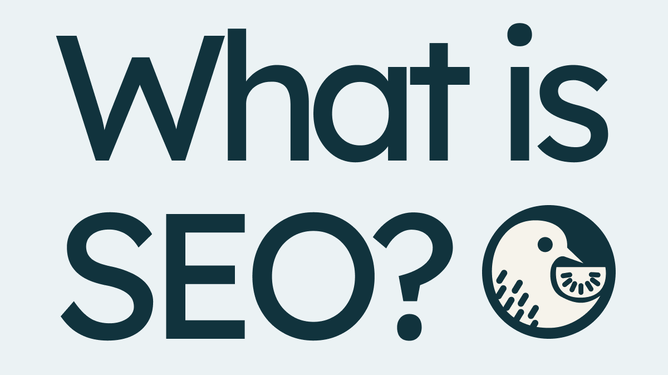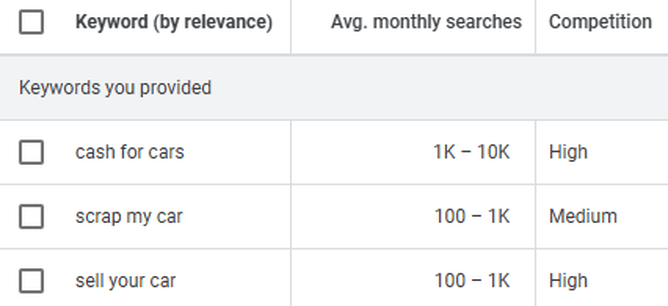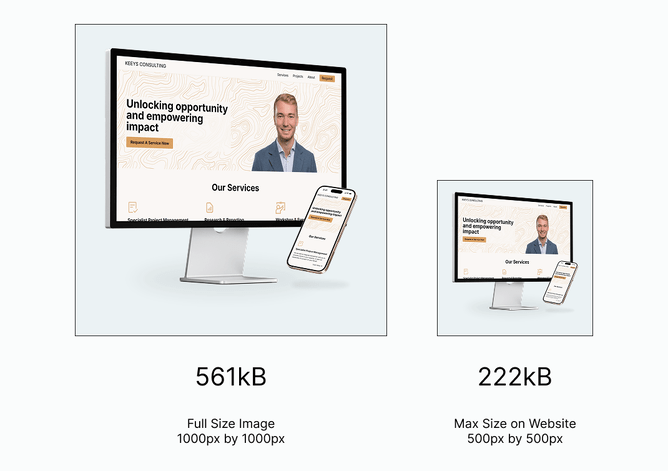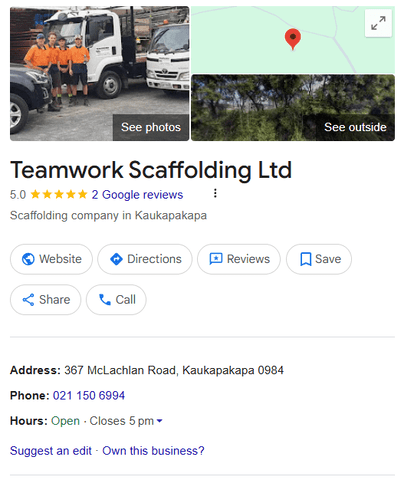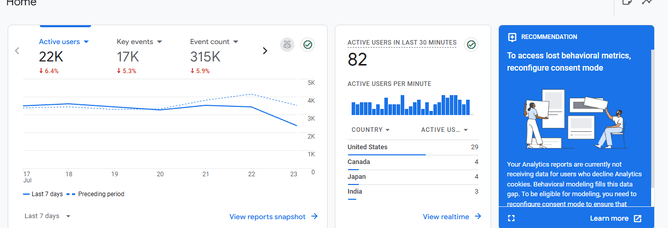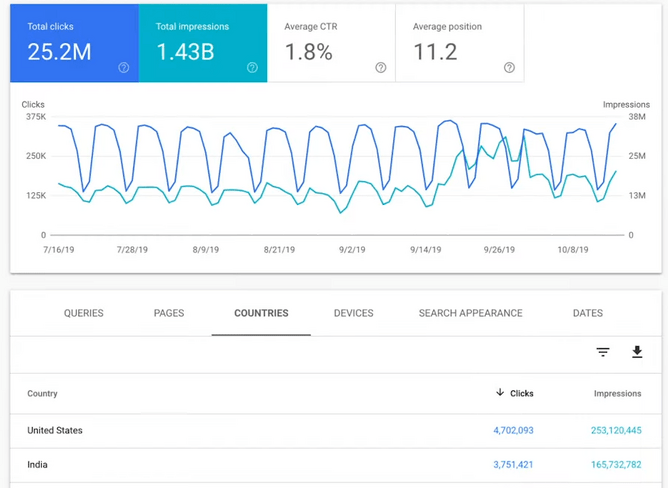You've probably heard about SEO and it's benefits, but what exactly is it, and why is it so important for your website’s success?
SEO stands for Search Engine Optimisation, and it is also, in many ways, an encompassing term for new things like AI Overviews (AIO), and Generative Engine Optimisation (GEO).
It is the process of optimising a website and its webpages to rank as high up a Search Engine Result Page (SERP) as possible for a particular search query. Appearing higher up a SERP helps increase click-through-rate (CTR). A result in the #1 spot has a 10 times greater chance of being clicked than at #10, and we all know how desperate you have to be to go page two of a Google search so if you're not even on the first page it's even lower.
Too many businesses simply rely on ads or can’t put the required resources into all the things that go into a good SEO strategy like keyword research, content creation, technical updates, getting backlinks etc. so keep reading to understand some of the basic, yet essential parts of optimising your website for search engines.
SEO Basics
How do search engines find your website?
Before a webpage can be found in a search engine it first must be crawled. This is where one of Google's digital robots go searching for webpages. Google states that “crawlers are used to find information for building Google's search indexes” among other things.
Once the crawler has found the webpage and analysed it then it will be stored in the search engines index, which means the page is eligible to be found in a SERP.
Ranking is the complex process done by a search engine’s algorithms in order to see what is the most relevant webpage for a user's search query. Ranking algorithms are constantly changing so continuing to update your website is necessary to keep ranking highly in SERPs.
E-E-A-T
While EEAT is not a direct ranking factor in Google's algorithms, it is a crucial element in how search engines assesses content quality. EEAT stand for Experience, Expertise, Authority, and Trustworthiness.
Experience can be shown through sharing a first hand experience with a topic. Content written by someone who has little to no experience will be surface level, and the topic won't be covered as deeply as someone with hands on experience.
Expertise is shown through thorough research of a topic, credentials and citations of good sources. Experts content will be more nuanced and well thought out compared to that of a novice.
Authority is about having high quality content which has been cited by others, and generally having a good reputation. Search engines love to see backlinks to your content from other websites, this shows them that you are a leader in the industry.
Trustworthiness is probably the most abstract of the 4 key principles but it is a combination of the other three as well as not using an spammy techniques like keyword stuffing.
On-Page SEO
On-Page SEO is basically what it sounds like, optimising the content on your webpage. Having optimised keywords, heading tags, images, and meta descriptions can all lead to higher rankings in SERPs when done well. They are also essential to a good user experience (UX) as they help them to quickly find the information they are looking for.
Keywords
Keywords are the words and phrases that people type into search engines to find information, products, or services online. There are three different types of keywords: head terms; body keywords; and long-tail keywords.
Head terms are usually one word search queries like “cars”. Body keywords are more specific, usually 2 or 3 words long, for example “sell your car”. Long-tail keywords are longer queries or phrases often written as questions like “where to sell my car?”.
Head terms have higher search volume, and are more competitive to rank for it. Long-tail keywords will be easier to rank for as there is reduced competition but also reduced search volume. Body keywords tend to strike a balance in the middle.
Each keyword will have a different search volume and amount of competition. You will need to make sure to do keyword research before deciding on which keywords you want to rank for. Try using Google Keyword Planner to give yourself an idea of the search volume and competition for different keywords.
For example, if you were a scrapyard looking for cars you might choose to target “cash for cars” over “sell your car” due to the higher average monthly searches or you might choose to go for “scrap my car” due to the lower competition.
Title Tags & Meta Descriptions
If you have ever seen a search result, you will have seen what title tags and meta descriptions are. In the example below you will see the title tag is “Robbie.kiwi: Hibiscus Coast Web Design” which is in the large blue text, with the meta description below it in the smaller gray text.
Title tags and meta descriptions are not only important for SEO, allowing search engines to understand what the page is about, but it also helps increase CTR when they are well written.
Title tags (or title link) should briefly describe the contents of the page and should be between 50 and 60 characters long. Rocketspark recommends "having your keyword phrase and your company name in your title tag" for the best results.
When writing a meta description you should give potential visitors relevant information about the content of that specific page for example a product page might have price, brand, and specs include in it meta description. Long meta descriptions will be cut off in SERPs so it is best not to exceed 160 characters.
Image Optimisation
Images can be optimised in a few different ways that affect both on-page and technical SEO. Here we will cover having descriptive alt text and file names, as well as optimising file size to help with page speed. Other image optimisations include file type, structured data, image sitemaps, and loading techniques.
Any image you have will have a file name, it may be something non-descript like “IMG_0351.png” or it could be more descriptive, e.g. “car-in-scrapyard.png” which will give the search engines much more information about the content of the image.
Likewise with alt text on an image, if you have none or it is not descriptive it may affect a search engine understanding of the images content, and also any website user with accessibility issues.
When uploading images you should consider what size your image is going to be displayed at, having a file that is larger than necessary will affect your page load speed, which can increase bounce rate (people leaving your site back to the SERP). Use an image reducer and/or image compressor to decrease the size of your image file.
Heading Tags ← like this
Making sure that you have heading tags that are used correctly in your site is important to search engines and users, as it allows them to navigate the webpage. When using heading tags (A.K.A. H1, H2, H3…) you must make sure that it follows a logical order, this allows users to scan content more easily.
You should have one H1 per page, which describes the content of the page similar to a title tag. Under your H1 tags you will have H2 tags and under those you will have H3 tags. Do not mix and match otherwise you will confuse both search engines and your users.
Off-Page SEO
Moz describes Off-Page SEO as "a strategy that involves actions taken outside of your website to improve your search engine rankings". Getting mentions and maintaining a good reputation are key parts of Off-Page SEO, and often get overlooked when creating an SEO strategy.
Backlinks
A backlink, also known as an inbound link, is a link from one website to another, and one of the best indicators of a websites authority is the amount (and quality) of backlinks it has.
You can build links in many ways, including guest posts, collaborations (e.g., webinars, podcasts), local business directories, and paid advertorials. The key is to secure high-quality links from reputable websites, as these "votes of confidence" are far more valuable than numerous low-quality ones.
Online Reviews & Reputation
Positive customer reviews on platforms like Google Business Profile and other industry-specific sites are crucial. They build trust with potential customers and signal to search engines that your business is reliable and well-regarded, especially for local searches. Actively managing and responding to reviews is important for both Off-Page and Local SEO.
Social Media
An active presence on social media helps build brand awareness and drives traffic to your website. While social shares aren't direct ranking factors, they increase visibility, encourage content sharing, and contribute to your overall online reputation.
Local SEO
How many times have you searched for something "near me"? All the time, right? Whether it's somewhere to eat or you're in urgent need of a plumber you want a local business, not a place on the other side of town.
If you are business with a physical location or service a particular area then Local SEO is vitally important for success in the SEO landscape.
Google Business Profile & Social Media
The first, and most simple, thing you should do is create a Google Business Profile. This will make you eligible to be found in local packs with all your details right there for a customer to get in contact or view your website.
The setup process is straight forward but make sure you add as many of the details as possible to give yourself the best chance of standing out. Photos and videos will increase your credibility, and are a local ranking signal.
For example see a Google Business Profile for Teamwork Scaffolding Ltd below that appears when you make a google search for them, this may also appear when searching for generally for scaffolders. You will see that they have all the information needed to contact them, and even some reviews.
Along with Google's Business Profile there are many other directories and search engines with similar features like Facebook, Bing Places For Business, and Apple Maps where you can claim your business.
One thing to make sure of when setting up all these channels is to keep consistent messaging throughout especially your business name, address, phone, and other contact details.
Set up of your Google Business Profile is included as part of all our website packages at Robbie.kiwi, so you have a strong foundation of local SEO.
Technical SEO
Most modern website builders like Rocketspark or Squarespace will take care of most of your technical SEO needs. Most hosting plans on these platforms will offer an SSL/TLS certificates, sitemap.xml and robots.txt files, and you should be able to manage redirect codes if they aren't automatically.
If you are unsure what technical SEO your website builder handles check their documentation.
Upload a sitemap.xml
Google or any other search engine will take some time to crawl your website once it has been launched but one way to help this process along is to submit your sitemap.xml to Google Search Console or the equivalent webmaster tools for your preferred search engine.
Setting up Google Search Console for your domain requires DNS verification so if you are unfamiliar with this talk to a developer. Once you have set up your property on Google Search Console, navigate to the sitemaps tab under indexing.
At Robbie.kiwi, we include the setup of Google Search Console, and we'll take care of submitting your sitemap as soon as your website is launched.
Measuring Your SEO Progress
Before making any drastic changes to your website make sure you are set up to measure your websites traffic, and search rankings. Google Analytics and Google Search Console are great free tools to use to keep track of the key metrics. These metrics allow you to see how well your SEO strategy is working without just going by feel.
Having Google Analytics connected to your website will allow you to monitor your websites traffic including number of users, sessions, engagement time, bounce rate and many more. These metrics can even be broken down by different dimensions like device category, or country. Monitoring you organic traffic is a good place to start if your new to analytics.
Google Search Console helps you keep track of search ranking metrics. You can see all the different search queries your website has shown up for and gives you information on the number of impressions, your click-through-rate (CTR), and average position. If you notice any search queries with high impressions but a low CTR this is a query that might need some more attention, try updating your title tag and meta description for pages that are showing up for this.
Although not part of SEO you should also consider your conversion rate of your webpages because you can have all the traffic in the world but if people are getting in contact or buying your product then you still might not see your desired result.
Setting these tools up correctly is an essential step, and at Robbie.kiwi, we include the setup of Google Analytics and Google Search Console in all our website packages, so you're always equipped to monitor your performance.
Generative Engine Optimisation (GEO)
Artificial Intelligence (AI) is becoming more widely used, there is an increasing need to optimise for a new type of "search engine" and that includes the likes of OpenAI's ChatGPT, Google's Gemini and all the other large language models (LLMs) that are popping up. Generative Engine Optimisation (GEO) is this new part of SEO focused on this aspect of web optimisation.
AI has even begun to be seen in SERPs themselves through Google's AI Overview which appears above even the #1 ranking search result which is making ranking highly in a traditional SEO sense less effective.
AIOSEO says that to have AI optimised content it "needs to be more contextually relevant, comprehensive, and authoritative". When creating content you need User-Centric Approach rather than keyword stuffing, and also keep the EEAT principles in mind as these are beneficial to GEO and standard SEO.
In Summary
Hopefully, you will now be able to put into action some of these SEO techniques to improve your On-Page SEO through adding keywords to your webpages or building your reputation through Local and Off-Page SEO. You may even try your hand at making improvements to your Technical SEO.
As you now know, Search Engine Optimisation (SEO) has many important factors to consider and why it is important to have a good SEO strategy in place to measure and implement optimisation techniques to help achieve our websites goals.
Ready to build a website that not only looks great but also ranks higher and drives real business growth? We're here to help. Contact Robbie.kiwi today for a chat about getting your website seen and driving the results you need.
